If you’ve been keeping chickens for a while, or maybe new to chicken ownership, you may have noticed your chickens laying small eggs in your nesting box. These are known as “fairy” eggs. So why do chickens sometimes lay small fairy eggs? Turns out there are a lot of different reasons why this can happen. Let’s take a closer look.
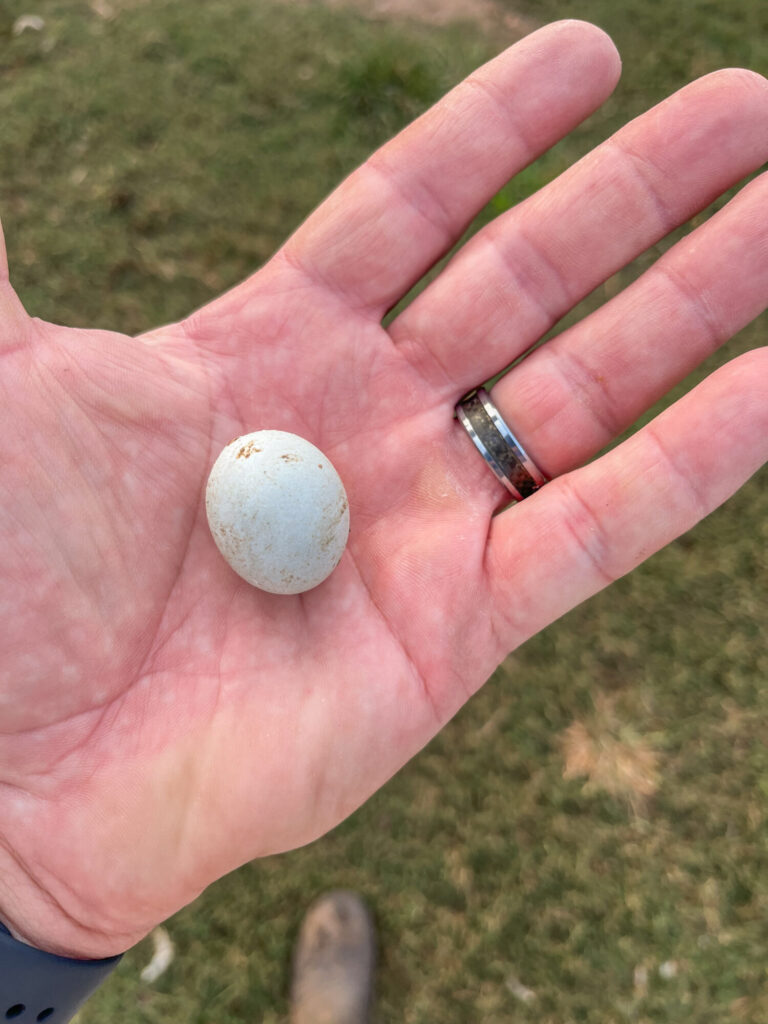
Fairy Eggs
A fairy egg is a tiny egg that a chicken sometimes lays, and it’s definitely a surprise when you find one in the nesting box. These small eggs are usually much smaller than normal-sized eggs and are usually just a harmless “glitch” in the chicken’s reproductive system.
They can happen for a few reasons, and most of the time, they’re nothing to worry about. For example, younger hens who are just starting to lay might produce fairy eggs as their bodies get used to the process. Older hens that are nearing the end of their laying cycle might also lay them occasionally.
However, if you notice your chickens laying small eggs repeatedly, it could be a sign of a bigger issue, like stress, illness, or a problem with her reproductive tract. In most cases, though, fairy eggs are just a one-time thing, and the hen will go back to laying her normal-sized eggs soon.
More Chicken Articles You’ll Love
- Which Breeds of Chickens Lay Pretty Purple Eggs?
- Will Baking Soda Hurt Chickens?
- 21 BEST Protein Sources For Backyard Chickens
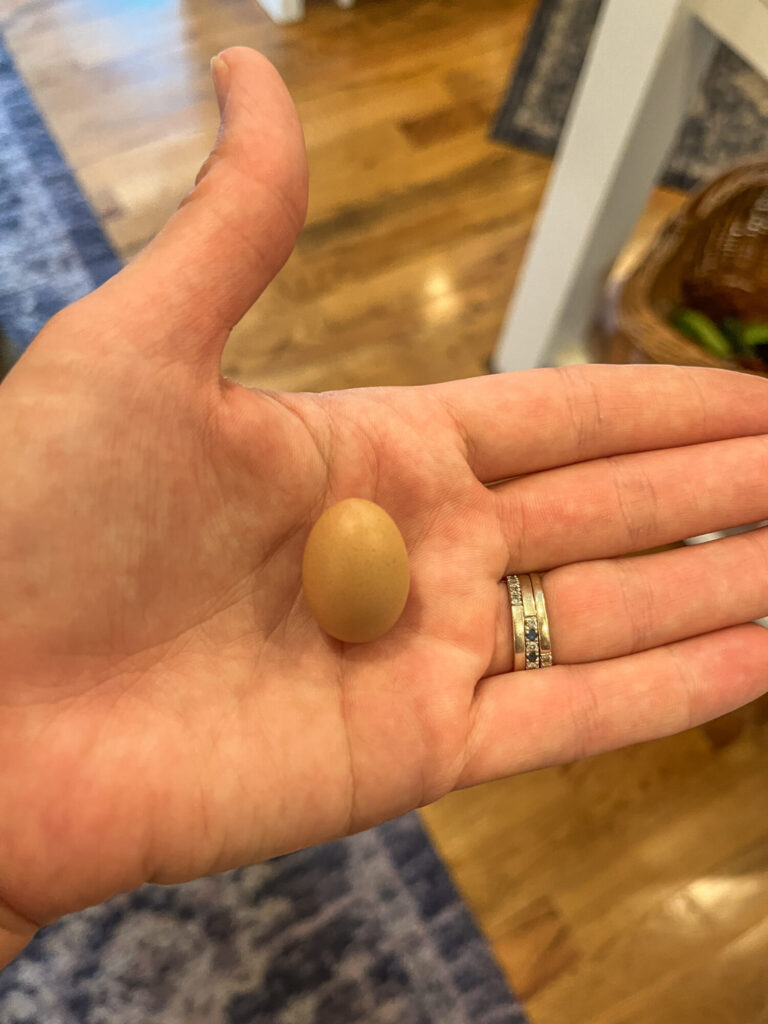
Causes of Fairy Eggs
*This post may contain affiliate links which means I make a small commission at no extra cost to you. Read my full disclosure here.*
A Glitch in The System
Sometimes, a fairy egg happens because of a glitch in the chicken’s reproductive cycle. Normally, a hen releases an egg yolk, which moves through her reproductive system to get surrounded by egg white (called albumin) and then covered with a shell.
But with a fairy egg, there’s no yolk at all. Instead, the hen might release a small piece of reproductive tissue by mistake.
Her body treats this tissue like a yolk and surrounds it with egg white before encasing it in a shell. This process results in a tiny, yolkless egg.
While it might seem strange, this is usually just a one-time hiccup in the hen’s reproductive cycle and not something to worry about unless it happens often.
New laying hen
When a young hen, called a pullet, starts laying eggs, her reproductive system might not be perfectly in sync yet. One of the common reasons for a yolkless egg is that the hen’s body thinks it has released a yolk, but it hasn’t.
Even without the yolk, her body will still produce albumin (the egg white) and form a small shell around it, resulting in what’s often called a fairy egg.
It’s also normal for pullets to lay smaller eggs when they first begin their egg production. These pullet eggs usually have yolks, and while they’re tiny compared to normal eggs, there’s nothing wrong with them.
As the hen continues to lay, her body will adjust, and the eggs should gradually increase in size until they reach the size of a typical egg. It’s all just part of her body figuring things out!
Old laying hen
As chickens get older and near the end of their laying cycle, it’s not unusual for them to lay tiny eggs, sometimes called fairy eggs, and these often don’t have a yolk. This happens because their reproductive system is slowing down, and they’re no longer producing eggs as regularly as they did during their prime.
Chickens usually hit their peak laying period when they’re about 18 months to 1 year old. After that, their egg production gradually declines, and you may notice changes in egg size or even the occasional fairy egg.
While it can seem strange to find one without a normal yolk, it’s just a natural part of their aging process. Even though older hens might lay fewer eggs, they can still produce some normal-sized eggs now and then. Egg production just won’t be as consistent as when they were younger.
Calcium deficiency
A calcium deficiency can be the cause of chickens laying smaller eggs or even soft shell eggs with thinner shells.
Hens need a lot of calcium to keep up their egg production, and if they don’t get enough from their diet, their bodies will actually pull calcium from their own bones to make up for it.
This can lead to health problems and weaker bones over time. To avoid this, it’s important to provide laying hens with enough calcium, often by offering oyster shells as a supplement.
Signs of low calcium include thin or brittle shells, or the hen might stop laying altogether. Making sure your flock has access to a calcium source helps them stay healthy and keeps their eggs strong and well-formed.
Check out my favorite calcium supplement for my flock.
Protein
Protein plays a big role in egg production, just like calcium.
Hens need plenty of protein to develop the egg white and the rest of the egg, and since feathers are mostly made of protein too, it’s easy to see why it’s so important.
If a hen isn’t getting enough protein, she might start laying fewer and smaller eggs, or even stop laying altogether.
For young hens, a severe protein deficiency can cause health problems and slow down their growth. To keep your flock healthy, it’s important to provide a balanced diet with all the essential nutrients they need, including enough protein.
If you notice your hens laying a series of small eggs, it might be a sign they need a protein boost, and offering a supplement could help get things back on track.
I supplement my flock with fly larvae, especially during the winter months.
Stress As a Cause of Chickens Laying Small Eggs
Stress can have a big impact on a hen’s ability to lay healthy eggs. When a hen feels stressed, her body shifts focus away from egg production, which can lead to fewer eggs or even smaller ones.
There are lots of things that can cause stress for a chicken, including extreme heat or cold, unsanitary living conditions, overcrowding, and the presence of predators.
Keeping your hens comfortable and safe is key to having healthy birds that produce eggs regularly.
Making sure they have enough space, clean coops, and protection from predators can go a long way in reducing stress and helping your flock lay healthy eggs consistently.
Reproductive issues
Sometimes, a fairy egg happens because something isn’t quite right with the hen’s reproductive system. This can happen to both young chickens just starting to lay and mature hens later in life.
If a hen lays a teeny tiny egg every now and then, it’s usually no big deal. But if she consistently lays these tiny eggs instead of the larger eggs she should be producing, it might mean there’s a problem with her reproductive system.
Issues like this can range from mild to serious, and many of them need to be checked out by a veterinarian. Keeping an eye on your hens and making sure they stay healthy is key to catching any problems early.
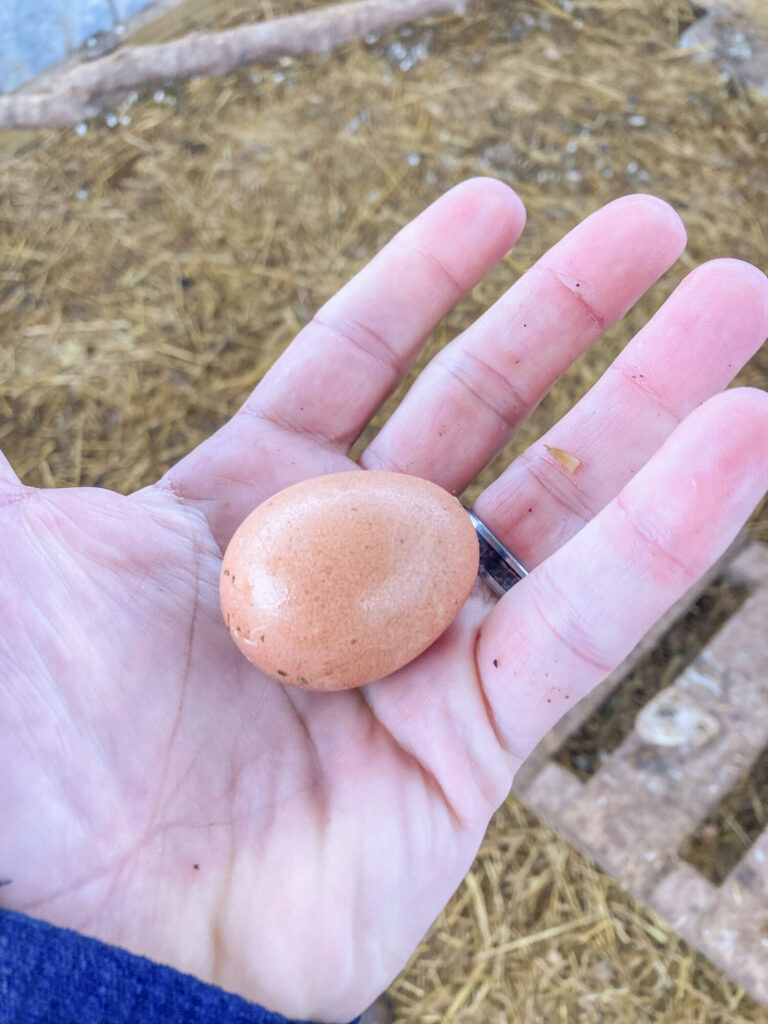
Helpful tips for dealing with fairy eggs
When your hen starts laying fairy eggs, there are a few helpful tips to figure out what might be going on.
First, check her age. Young chickens often lay teeny tiny eggs when they’re just starting out, and mature hens might lay them as they wind down their egg production.
Next, take a look at her overall health. Is she eating well and active? A lack of essential nutrients like calcium or protein can lead to small or abnormal eggs, so make sure her diet includes a good layer feed, along with supplements like oyster shells for calcium.
Also, consider any recent changes in her environment. Stress from extreme weather, overcrowding, or even a predator scare can throw off a hen’s reproductive system.
If she seems otherwise healthy, it’s probably just a temporary glitch, and she should go back to laying normal eggs soon.
However, if fairy eggs keep showing up, it might be worth keeping a closer eye on her to make sure there’s no underlying issue.
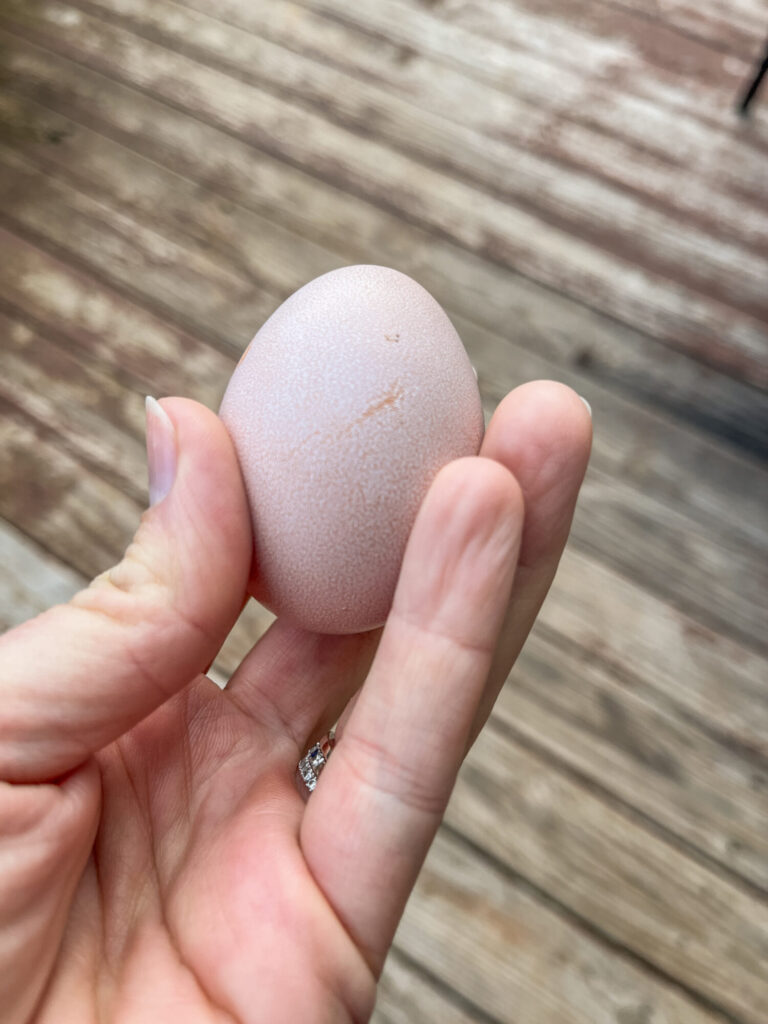
Frequently Asked Questions Regarding Chickens Laying Small Eggs
Why is my hen laying fairy eggs?
Fairy eggs happen when a hen’s reproductive system has a little hiccup. This is common in young chickens just starting to lay or in older hens slowing down. It can also happen if a hen is stressed, lacking nutrients, or going through changes like molting.
Are fairy eggs safe to eat?
Yes! Fairy eggs are safe to eat, but since many are yolkless, they’re more of a fun novelty than a meal. If they do have a yolk, they’re just like regular eggs, only smaller.
Will my hen go back to laying normal eggs?
Most of the time, yes. If the hen is young, her body will eventually adjust, and she’ll start laying larger, normal eggs. If the hen is older, she may continue to lay smaller eggs occasionally as part of the natural aging process.
Can stress cause fairy eggs?
Definitely, stress from things like heat, cold, predators, or overcrowded conditions can affect a hen’s egg production and lead to fairy eggs. Keeping your hens comfortable and safe can help reduce stress.
Should I be worried if my hen lays a lot of fairy eggs?
A fairy egg now and then isn’t usually a big deal, but if it happens often, it might be worth checking for issues like a nutrient deficiency or illness. Make sure your hens are getting a balanced diet and living in a clean, low-stress environment.
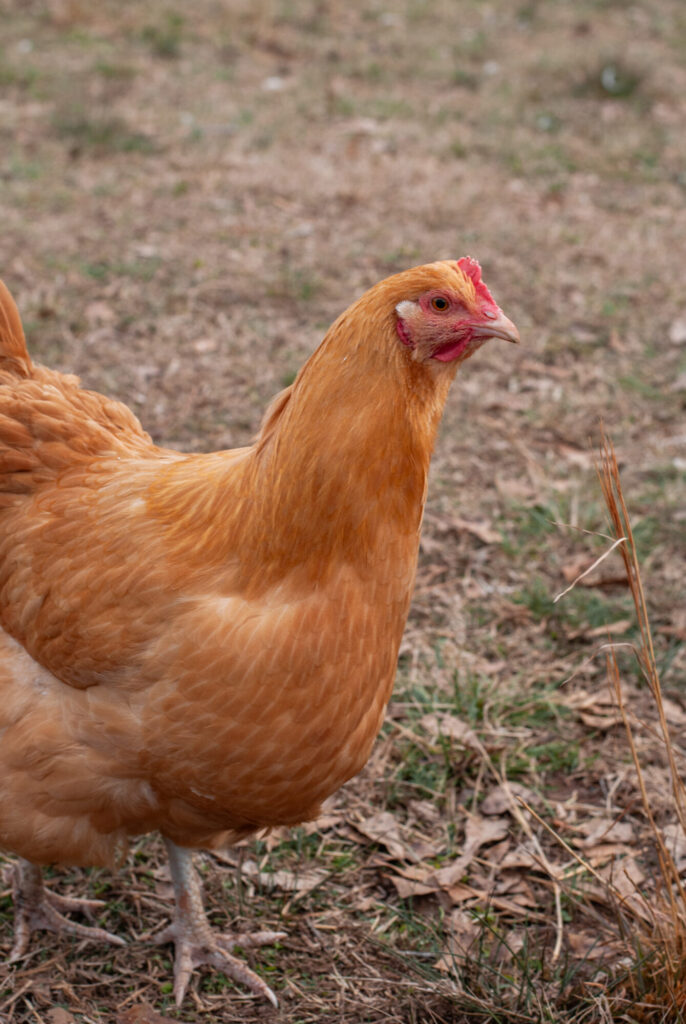
Final Thoughts
Fairy eggs might seem strange at first, but they’re usually just a normal part of a hen’s life. Whether it’s a young chicken figuring out her egg-laying routine or an older hen slowing down, these teeny tiny eggs are often nothing to worry about.
With the right care, most hens will go back to laying regular-sized eggs before long. As long as your flock is healthy, happy, and getting the nutrients they need, those small eggs are just another quirky surprise from your chickens.
If you enjoyed this article, please share it!
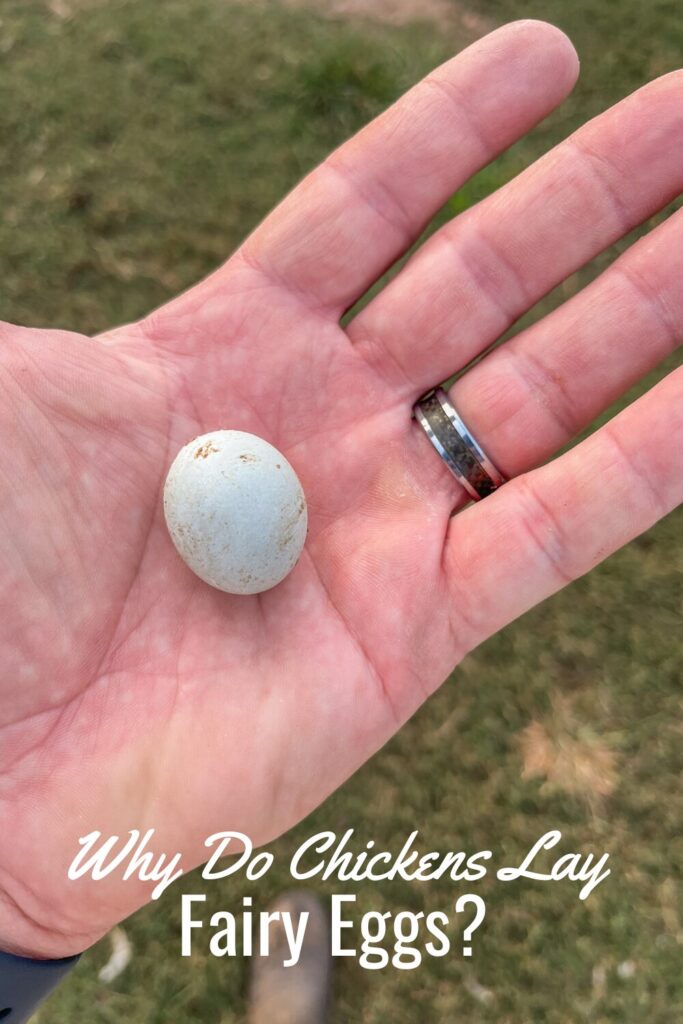
More From The Farm
Are you looking for an Easy DIY Chicken Waterer to provide your backyard chickens with fresh water while you’re away? This simple setup is perfect for the job. It’s easy and inexpensive to make and will make chicken keeping a little easier for the busy homesteader.
Leave a Reply